Most marketers don’t realize that Google has been losing search market share in EU countries.
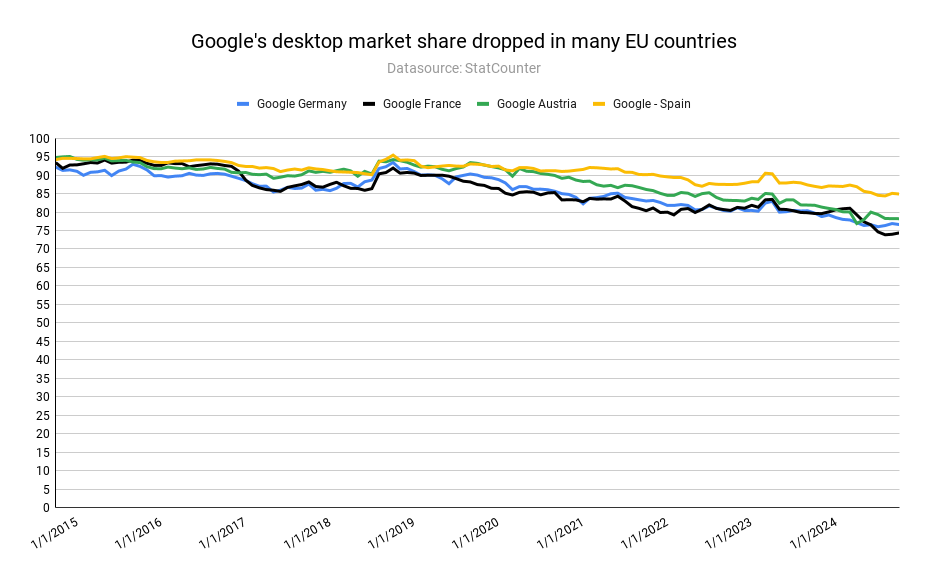 Image Credit: Kevin Indig
Image Credit: Kevin IndigThe drop in market share comes at a time when Google’s business is under siege:
- The DoJ recommended separating Google from Chrome and Android amid a lawsuit against Alphabet. (I summarized the lawsuit and potential outcomes in Monopoly.)
- The Justice Department runs a separate lawsuit against Google’s advertising business.
- Canada just sued Google over anti-competitive practices in online ads.
- ChatGPT, Perplexity & Co are growing mind and market share. (I covered the meteoric rise of ChatGPT in ChatGPT Search.)
- Google faces heavy regulation in the EU from the DMA (Digital Marketing Act), which I wrote about in 2 Internets.
So, the question is two-fold: How much does the drop in market share matter, and what is the driver?
The short answer is that the drop matters more than Alphabet might like to admit.
It gives oxygen to competitors and weakens the body in the fight against external agents. Google’s revenue is still strong, but advertising market share is declining.
A mix of regulation, competitors, and negative sentiment toward Google seem responsible for the drop.
The implication is that marketers increasingly need to track and optimize for more search engines, but a more fragmented playing field could also be an opportunity for more referral traffic from search engines to websites.
Boost your skills with Growth Memo’s weekly expert insights. Subscribe for free!
What Is Going On With Google?
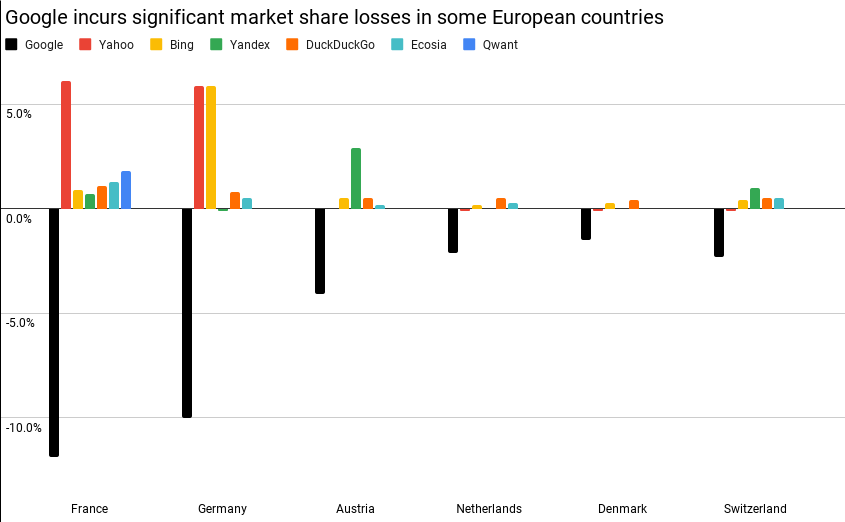 Image Credit: Kevin Indig
Image Credit: Kevin IndigGoogle’s market share over the last 10 years dipped by -5.6 pp (percentage points) in France and -3.3 pp in Germany.
StatCounter has never recorded such a low share since measuring data in January 2009.
France and Germany are not the only ones. Most EU countries saw Google’s market share drip in the last five years (mobile):
- Austria: -4.1 pp.
- Poland: -3.1 pp.
- Switzerland: -2.3 pp.
- Netherlands: -2.1 pp.
- Denmark: -1.5 pp.
Zooming further in also doesn’t change things. Google market share over the last 12 months (mobile):
- France: -4.6 pp.
- Austria: -3.2 pp.
- Poland: -2.4 pp.
- Germany: -2.1 pp.
- Switzerland: -1.3 pp.
- Netherlands: -1.0 pp.
- Denmark: -1.0 pp.
What’s going on? The picture becomes clearer when we look at when the trend changes. There are two inflection points: November 2018 and April 2024.
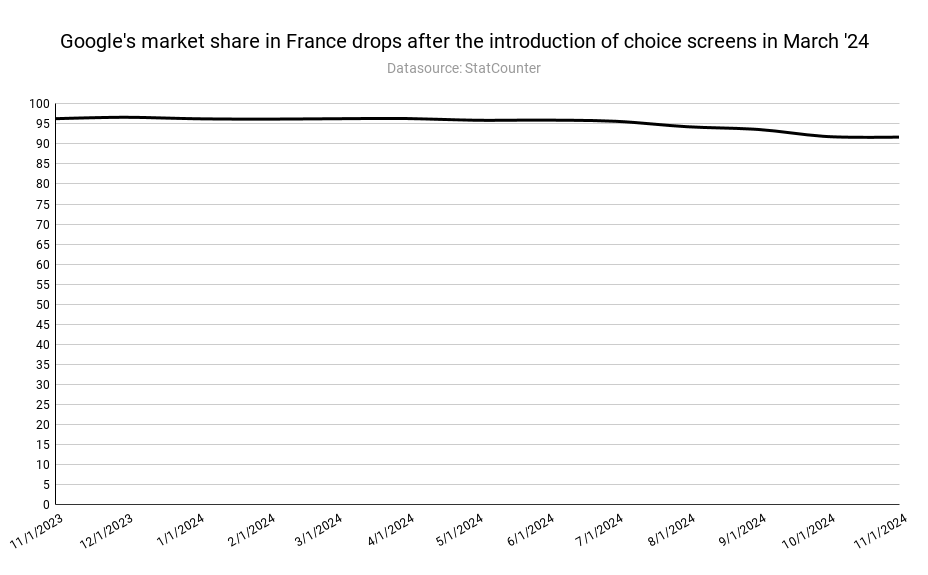 Image Credit: Kevin Indig
Image Credit: Kevin IndigThe data shows a shift away from Google starting around April, a month after Android and Apple introduced choice screens for browsers and search engines.
In other words, Google can no longer be the default search engine on mobile and desktop devices. We’re starting to see the results.
However, not all countries see a dip. Why?
Why Are Some Countries Flat?
Google’s market share isn’t down in every EU country, e.g.:
- Portugal.
- Spain.
- Italy.
- Ireland.
How come? These countries are part of Europe, and users see a choice screen.
The answer is devices. The countries listed above lost market share on desktop but not mobile.
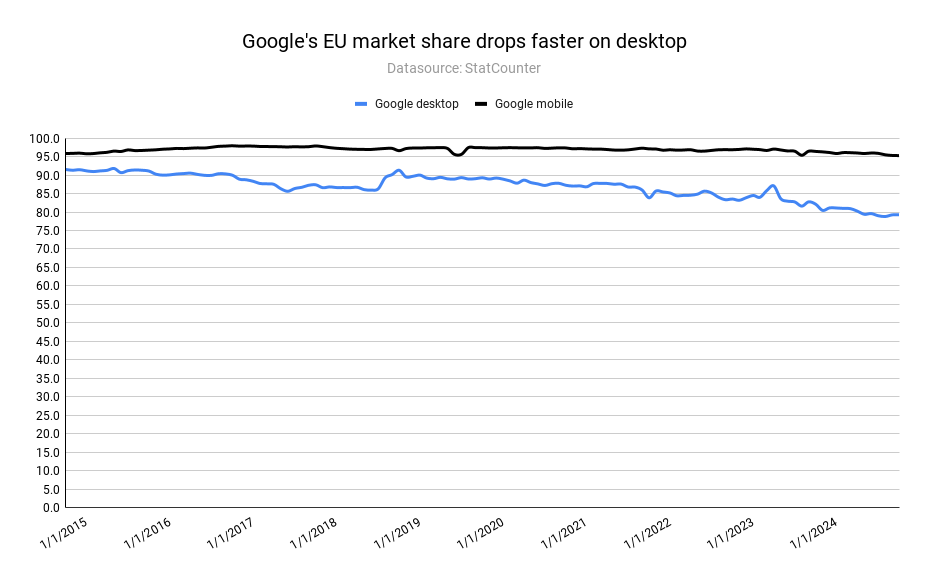 Image Credit: Kevin Indig
Image Credit: Kevin IndigThis happens everywhere in the EU. Over the last five years, Google lost -2.1% market share on mobile compared to -10% on desktop in the EU.
Why?
A big part of the reason is the exclusive distribution agreement with Apple.
Windows is the dominant desktop operating system, with +75% in the EU, largely because of its domination in corporate computing. MacOS has only 15.1%.
While Android (Google’s operating system) also has the majority market share on mobile with 66.5%, Apple’s iOS has 33%.
And since Google is the default search engine on Apple devices by paying a $20 billion fee, its position is more solid in the EU on mobile – until the DMA forced choice screens in March.
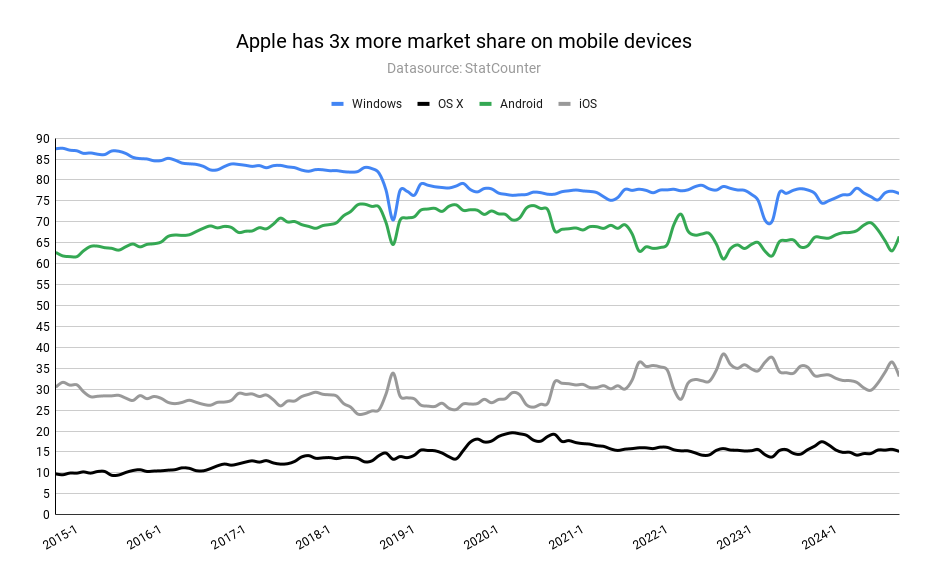 Image Credit: Kevin Indig
Image Credit: Kevin IndigBut what about countries that show a decline in Google’s market share before March? Way before!
Why Does The Dip Start Earlier In Some Countries?
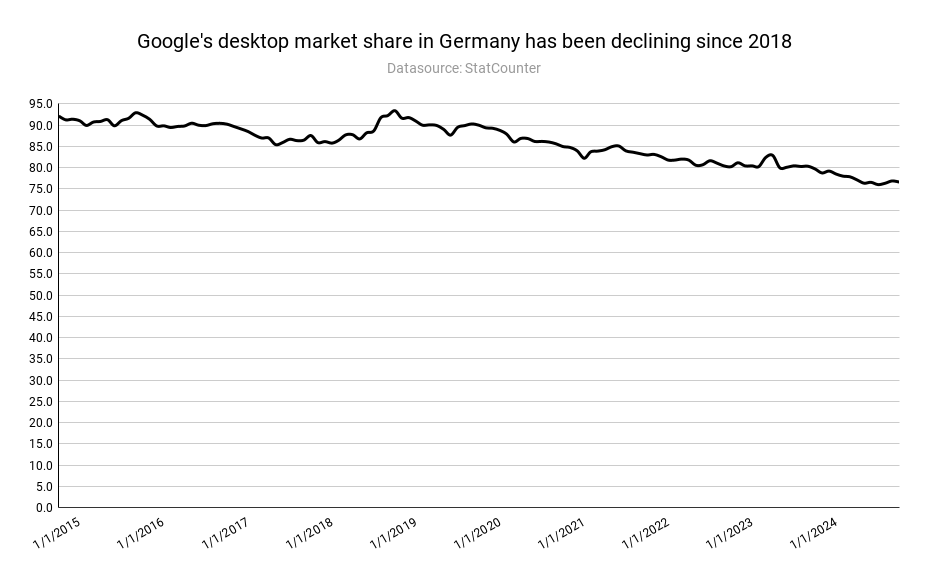 Image Credit: Kevin Indig
Image Credit: Kevin IndigGoogle lost market share in countries like Germany and Portugal as early as November 2018. So, there must be something else going on besides choice screens and device-specific dynamics.
Two things happened in 2018: First, GDPR, the European data protection law, came into effect in May 2018. Second, the EU fined Alphabet €4.34 billion for antitrust violations related to Android’s market dominance.
Both events didn’t directly decrease Google’s market share but set off a period of Google mistrust that gave space to smaller competitors like DuckDuckGo and Bing.
Europeans are much more privacy-sensitive, which means regulatory fines and privacy laws influence consumer behavior much more than the U.S.
For example, the European privacy search engine StartPage gets 56% of searches from the EU and 21% from the U.S.
Users visit Google less because of privacy concerns. France declared not to use Google as a default search engine for some ministries in November 2018.1
Choice screens and public perception are the biggest drivers behind Google’s decline. Google sends less referral traffic to websites. So, what is the effect?
Who Wins What Google Loses?
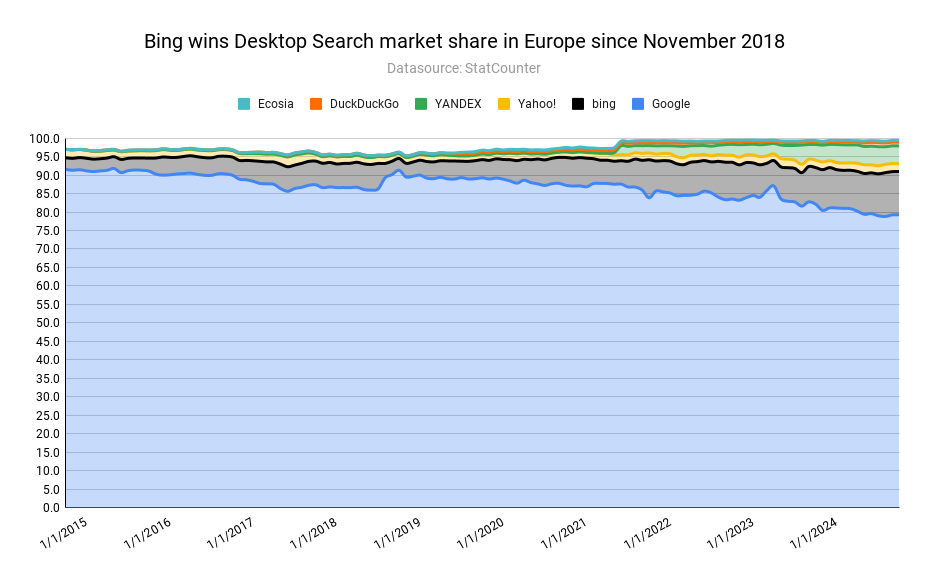 Image Credit: Kevin Indig
Image Credit: Kevin IndigThe biggest winner of Google’s decline is Bing. The ever-second search engine is the biggest beneficiary of Google’s decline.
It’s very possible that ChatGPT and its close affiliation with Microsoft gave its search engine a bigger boost in Europe than originally assumed, but Bing is also the second choice in cons’ minds.
Now, these numbers are still peanuts, and search engines like DuckDuckGo, Ecosia, and QWANT license search results from Bing and Google. So, you could say that Google and Bing win, after all.
However, Ecosia and QWANT are working on a joint web index to become independent from other search engines.
How much longer until DuckDuckGo and others announce their own index as well? When the alpha gets weaker, the smaller animals smell the opportunity.
Despite the decline in market share, Google’s search revenue is still growing impressively fast at its scale. Why?
- Market share doesn’t have to correlate with search volume or monetizable queries.
- There are more mobile than desktop searches, and mobile searches drop to a smaller degree.
- Google still dominates in other markets – the EU might not be enough to put a dent into Google’s revenue that the company couldn’t compensate.
- Google has been more aggressive in search monetization than the drop in market share.
Relative ad revenue growth, which is predicted to fall below 50% next year, could be a better indicator than absolute growth.
I also want to point out a caveat in the data: StatCounter gathers data by measuring referral traffic on 1.5 million sites. There is a chance that Google sending out less traffic to websites and keeping it to themselves affects the numbers.
What Are The Implications?
Google’s dropping market share in the EU, combined with potential antitrust remedies (like a forced end to the distribution agreement with Apple) and more competition, will likely fragment Search further.
In other words, we might optimize for more search engines (again). Most of them might function similarly in ranking but might need site owners to take dedicated indexing actions, such as integrating with Bing’s IndexNOW.
We’ve already dusted off our Bing Webmaster Tools when it turned out ChatGPT is using Bing results for its search feature. What’s next? Perplexity webmaster tools? Boosted by growing market share, SEO professionals should pay more attention to Bing.
Other search engines don’t have webmaster tools yet – to my surprise. What better way to foster a relationship with site owners than a portal? But with increasingly independent indices, that could become a reality soon.
Ironically, the monopoly lawsuit against Google comes just as the company gets more competition. A 1% market share of a giant like Alphabet can create a unicorn with $1.75 billion in ARR.
Browsers play a critical role in the search engine wars. The DoJ is pushing for Chrome to divest from Google, and OpenAI is working on its own browser.2
In my opinion, OpenAI should buy Arc. Either way, browsers are the ultimate internet user interface and offer more user information than search engines can chew.
I want to be clear that I don’t think Google is doomed to fail. Google has all the ingredients to come out on top in the “new AI world.” The only reason it will fail is by standing in its own way.
1 France is ditching Google to reclaim its online independence
2 OpenAI Considers Taking on Google With Browser
Featured Image: Paulo Bobita/Search Engine Journal





![AI Overviews: We Reverse-Engineered Them So You Don't Have To [+ What You Need To Do Next]](https://www.searchenginejournal.com/wp-content/uploads/2025/04/sidebar1x-455.png)